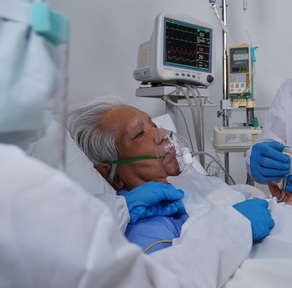Watchdog warn 30% patients were discharged from hospital before receiving COVID results
Nearly a third of patients tested for COVID-19 while in hospital did not receive their test results before being discharged during the first five months of the coronavirus pandemic, a new survey suggests.

The survey carried out by Healthwatch England, with support from the British Red Cross found 30 per cent of those who did not receive their test results before they left raised a barrier to ensuring care needs were met to manage their care safely after discharge.
Staff highlighted this was particularly problematic when patients were discharged to a care home given the heightened risk of transmission among residents.
'It’s essential we learn from the impact a poorly-handled discharge can have'
The survey also found the majority of people polled (82 per cent) did not receive a follow-up visit and assessment at home and almost one in five (18 per cent) of those also reported having unmet needs, such as equipment, medication or advice.
Over a third (35 per cent) of respondents and their carers did not get a contact for further advice, despite this being a recommendation.
Around one in five (19 per cent) of patients felt unready to leave hospital and missed out on vital follow-up visits and assessments.
Sir Robert Francis, chair of Healthwatch England, said: “In March, hospitals were asked to discharge patients with little or no notice and the speed with which this took place was important but led to mistakes. We do not want to detract from the heroic efforts of those on the frontline, who often put themselves at great risk to care for their patients, but services and system leaders have now had more time to prepare.”
Over 500 patients and carers (both paid and unpaid) across England took part in the survey, between late March to late August. Eight local Healthwatch and partners around the country carried out 61 in-depth interviews with key staff groups involved in the discharge process.
Sir Robert said: “It’s essential we learn from what people have shared with us about the impact a poorly-handled discharge can have on them and their loved ones.
“Taking action now will not only reduce the risk to patients but will also help improve the way people leave hospital in the future.”
As winter approaches and the pandemic continues, the British Red Cross is working alongside NHS and social care services to get people home safely from hospital.
Mike Adamson, chief executive of British Red Cross said: "We’ve seen first-hand the huge efforts made to improve the discharge process for patients and their families. However, we also know despite good intentions and hard work, there are still barriers to making the ideals of discharge policy a reality.
“The Red Cross has been bearing witness to these issues for years, and we hope that the increased urgency of the situation will bring lasting change. Many of the people we support are older or more vulnerable, and fall into the higher-risk categories for COVID-19."
Healthwatch England and the British Red Cross have now made a number of recommendations to help manage hospital discharges amid the second peak of the pandemic.
• Post-discharge check-ins: services should ensure these take place as per policy, whether by phone or in person
• Discharge checklists: questions should include transport home, and equipment required
• Communication: patients and carers should be assigned to a single point of contact for further support, in line with the national policy
• Medication: linking patients to voluntary sector partners who can deliver medicine could avoid discharge delays. Pharmacists should also be considered as part of multi-disciplinary teams supporting in the community
• Boost community care capacity and recognise value of the voluntary care sector in hospital discharge: the ‘discharge to assess’ model depends on follow-up assessments and care being available. Longer-term, more investment is needed to ensure this happens, including in the voluntary care sector
Mr Adamson added: ”Simple interventions, like getting equipment and medicine delivered, or follow-up visits, can make the difference between good recovery or someone regressing to the point of readmission - precisely at the time we want people to stay well, and stay at home.”
Professor Stephen Powis, NHS national medical director, said: “There has long been a wide consensus about the benefits for patients of being able to return home as soon as their specialist hospital care is complete, and it is good that delays have been reduced in recent times. While this is a very small snapshot survey, local hospitals will want to take account of the points it makes.”
Latest News
 29-Jul-24
Dementia Bus gives carehome.co.uk staff insight into life with dementia
29-Jul-24
Dementia Bus gives carehome.co.uk staff insight into life with dementia
 27-Jul-23
UK's top home care agencies in 2023 revealed
27-Jul-23
UK's top home care agencies in 2023 revealed
 30-Nov-22
A quarter of older people keep their falls secret from family
30-Nov-22
A quarter of older people keep their falls secret from family
 29-Nov-22
'Covid-19 has not gone away' say terminally ill
29-Nov-22
'Covid-19 has not gone away' say terminally ill
 28-Nov-22
IT consultant who received poor care opens 'compassionate' home care business
28-Nov-22
IT consultant who received poor care opens 'compassionate' home care business